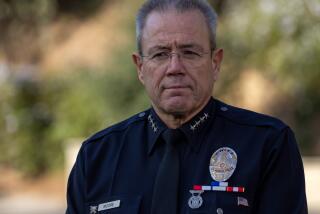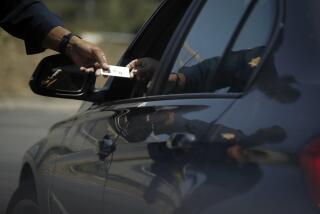Federal court rules Anaheim officers didn’t use excessive force
SAN FRANCISCO — Two Anaheim police officers said they pulled over a van at 2 a.m. after noticing it weaving in its own lane. The officers suspected the driver had illegal drugs.
When the driver failed to obey police commands, a struggle ensued. One officer hit the driver on the arm with his flashlight and punched him in the face and head. The other officer hit the driver on the back of his head with a flashlight. When the driver began to accelerate with an officer inside the van, that officer shot the driver in the head, killing him.
A divided federal appeals court decided Monday that the officers did not use excessive force in the 2009 incident.
Ruling 2 to 1, the U.S. 9th Circuit Court of Appeals upheld the dismissal of a civil rights lawsuit by the dead man’s family. The decision, unless overturned on appeal, means the suit will not go to trial.
The ruling came after the Anaheim Police Department faced widespread criticism, including days of street protests, over officer-involved shootings. The killing examined by the appeals court received little attention when it occurred, but the ruling revealed how difficult it might be to hold police liable in such cases.
Adolf Anthony Sanchez Gonzalez, 21, came to the attention of Anaheim police that September morning after making an illegal left turn into a gas station, according to the court. He was driving his father’s van.
Two Anaheim officers, responding to a routine call elsewhere, noticed on their way back that Gonzalez’s van was still at the gas station.
They ran the license plate number, learned the van had been “involved in a prior narcotics stop” and began to follow it “to see if any law enforcement action was necessary,” the court said.
After stopping the van, Officer Daron Wyatt approached the front passenger’s side, and Officer Matthew Ellis the driver’s window. Wyatt drew his gun after seeing Gonzalez reach for something and told him he would shoot if he reached again, the court said.
Gonzalez put his hands in his lap, fists clenched. Suspecting he had drugs, the officers ordered him to open his hands. He refused.
Wyatt reached inside and hit Gonzalez on the arm three times with his flashlight, the court said. Gonzalez moved his hand toward his mouth, as though he was going to ingest something, and Ellis began to struggle with him.
Wyatt radioed for backup, entered the van from the passenger side and “with both of his knees on the seat, began punching Gonzalez in the head and face,” the court said. Ellis then hit him three times on the back of the head with a flashlight, according to the court.
The van started to move, with Wyatt still in the passenger seat, and Wyatt shot him in the head. Gonzalez died shortly thereafter. An attorney for his family said a bindle of narcotics was later found in his mouth.
The court majority said Wyatt could have been killed or seriously injured when the van began to move.
“At each stage of the encounter, the officers were forced to make split-second decisions,” wrote Judge Diarmuid F. O’Scannlain, who was joined by Judge Stephen S. Trott.
“The force that they used was not excessive or disproportionate to the quickly escalating situation.”
Judge Richard R. Clifton, in a dissent, said the officers’ version of what happened “appears to be physically impossible” and was “not internally consistent.” Clifton said statements by the officers raised doubts about their claim that Gonzalez floored the van and was traveling at 50 mph when Wyatt shot him.
“It is for the jury to weigh the evidence, not us,” Clifton wrote.
“If Wyatt was sitting in the passenger seat of a vehicle going 3 to 4 miles per hour when he whipped out his gun and, without warning, shot Gonzalez dead, a reasonable jury might conclude that his actions were unreasonable,” Clifton wrote.
Moses W. Johnson IV, assistant Anaheim city attorney, said an investigation by the Orange County district attorney exonerated the officers. No weapon was found on Gonzalez or in the van.
Attorneys for the Gonzalez family said the ruling surprised and disappointed them. They were considering an appeal.
More to Read
Start your day right
Sign up for Essential California for news, features and recommendations from the L.A. Times and beyond in your inbox six days a week.
You may occasionally receive promotional content from the Los Angeles Times.







